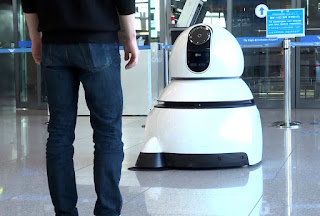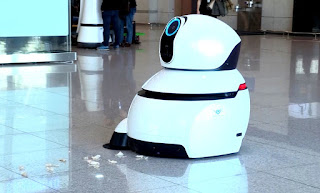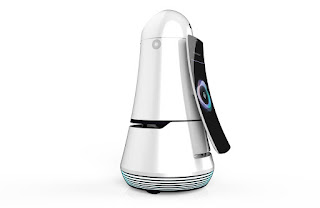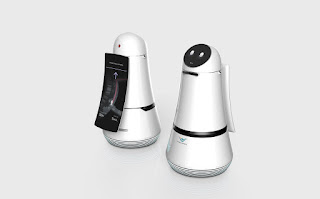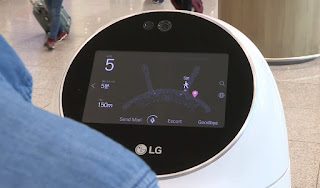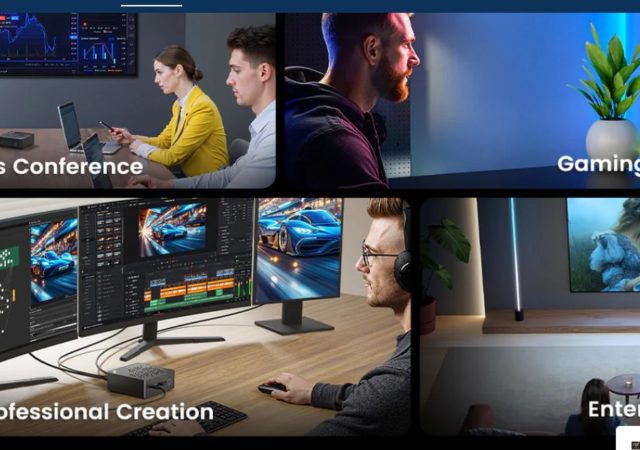LG Robots
to Deliver Expert Service for Visitors to Korea
to Deliver Expert Service for Visitors to Korea
.embed-container { position: relative; padding-bottom: 56.25%; height: 0; overflow: hidden; max-width: 100%; } .embed-container iframe, .embed-container object, .embed-container embed { position: absolute; top: 0; left: 0; width: 100%; height: 100%; }
SEOUL, July 21, 2017 — As South Korea prepares for
the largest winter sporting event in its history, LG Electronics (LG) is
focusing on improving automated services at the main hub for the world’s
travelers – Incheon International Airport (IIA). Starting on July 21, LG will
put into trial service a number of Airport Guide Robots and Airport Cleaning
Robots at the award-winning airport to assist travelers arriving and departing
Korea. The Airport Guide Robot will roam the airport providing information and
assistance to visitors while the Airport Cleaning Robot will be on hand to keep
the floors impeccably clean.
the largest winter sporting event in its history, LG Electronics (LG) is
focusing on improving automated services at the main hub for the world’s
travelers – Incheon International Airport (IIA). Starting on July 21, LG will
put into trial service a number of Airport Guide Robots and Airport Cleaning
Robots at the award-winning airport to assist travelers arriving and departing
Korea. The Airport Guide Robot will roam the airport providing information and
assistance to visitors while the Airport Cleaning Robot will be on hand to keep
the floors impeccably clean.
By dispatching its robots to
one of the largest and busiest airports in the world, LG will be able to
provide its robotic services to approximately 57 million travelers who pass
through the airport every year. While the robots are officially going into trial
service today, they have been a familiar presence to frequent travelers since
February, when they began beta testing at IIA. LG engineers have been fine
tuning the robots for the past five months, improving their performance based
on the data and experience collected during the beta test.
one of the largest and busiest airports in the world, LG will be able to
provide its robotic services to approximately 57 million travelers who pass
through the airport every year. While the robots are officially going into trial
service today, they have been a familiar presence to frequent travelers since
February, when they began beta testing at IIA. LG engineers have been fine
tuning the robots for the past five months, improving their performance based
on the data and experience collected during the beta test.
Equipped with LG’s voice
recognition platform, the Airport Guide Robot understands four different
languages – Korean, English, Chinese, and Japanese – the four most popular
languages spoken at the airport, in order to provide assistance verbally. The robot
can connect to the airport’s central server to provide information regarding
boarding time and locations of restaurants, shops, and much more. With a quick
scan of a boarding pass, the Airport Guide Robot can escort the late or lost
traveler to the right departure gate on time.
recognition platform, the Airport Guide Robot understands four different
languages – Korean, English, Chinese, and Japanese – the four most popular
languages spoken at the airport, in order to provide assistance verbally. The robot
can connect to the airport’s central server to provide information regarding
boarding time and locations of restaurants, shops, and much more. With a quick
scan of a boarding pass, the Airport Guide Robot can escort the late or lost
traveler to the right departure gate on time.
The Airport Cleaning Robot
takes LG HOM-BOT’s powerful cleaning performance, autonomous navigation, and object-avoidance
capability and applies them to a commercial, public environment. This robot
detects the areas that require the most frequent cleaning, stores those locations
in its database and calculates the most efficient routes to get there.
takes LG HOM-BOT’s powerful cleaning performance, autonomous navigation, and object-avoidance
capability and applies them to a commercial, public environment. This robot
detects the areas that require the most frequent cleaning, stores those locations
in its database and calculates the most efficient routes to get there.
With these airport robots, LG
is demonstrating its initiative to develop and expand its commercial robot business
as a future growth engine. Currently, LG’s robot business is divided into two
sectors: home and commercial. LG’s home robots include the HOM-BOT vacuum
cleaner and the new Hub Robot while LG’s commercial business consists of robots
specially designed to provide services in public areas such as airports, hotels
and banks.
is demonstrating its initiative to develop and expand its commercial robot business
as a future growth engine. Currently, LG’s robot business is divided into two
sectors: home and commercial. LG’s home robots include the HOM-BOT vacuum
cleaner and the new Hub Robot while LG’s commercial business consists of robots
specially designed to provide services in public areas such as airports, hotels
and banks.
“LG is dedicated to the
advancement and development of its robot technologies which includes navigation,
voice recognition, natural language processing, and of course, DeepThinQ,” said
Song Dae-hyun, president of LG Electronics Home Appliance & Air
Solutions Company. “It is this kind of effort and innovation that will drive LG
forward in the Fourth Industrial Revolution.”
advancement and development of its robot technologies which includes navigation,
voice recognition, natural language processing, and of course, DeepThinQ,” said
Song Dae-hyun, president of LG Electronics Home Appliance & Air
Solutions Company. “It is this kind of effort and innovation that will drive LG
forward in the Fourth Industrial Revolution.”
For the LATEST tech updates,
FOLLOW us on our Twitter
LIKE us on our FaceBook
SUBSCRIBE to us on our YouTube Channel!


